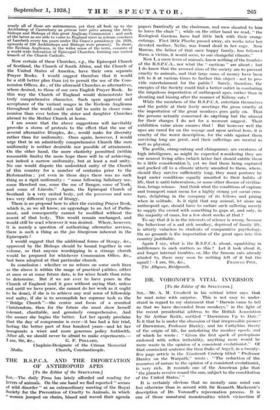THE FUTURE OF THE ENGLISH CHURCH: COMPROMISE OR COMPREHENSIVENESS ?
[To the Editor of the SPECTATOR.] SIR,—Amid all the debates. and correspondence anent the Church during recent years, I cannot recollect any serious attempt to discover the real Eons et origo of our present-day troubles. Why is the Church of England in such a state of confusion and chaos ? What is the underlying cause of
all this un-Christian dissension and party strife ? Some would answer, a selfish and disloyal pseudo-Romanism at one extreme. Others, an intolerant and uncharitable Pro- testantism at the other extreme.
Others, the lack of proper ecclesiastical courts such as churchmen could respect. Others, the need of a central authority respecting rites and ceremonies. Others, the fact that our Bishops do not act in concert, and that what is permitted in one diocese is forbidden in another. And so forth. But while these may be perhaps contributory causes, I believe that the ultimate explanation of our troubles of to-day is that for upwards of three and a-half centuries our Church has unconsciously been guilty of a grave error of policy. May I explain ?
Ever since the Elizabethan settlement, the Church of
England has been a comprehensive body. Herein she differs (in theory at least) from virtually every other Church in Christendom, for she includes—and was expressly intended
to include—within her fold widely different types of church- manship. She is not " one " in the sense that she requires a rigid uniformity of belief and practice. She is tolerant not merely of a wide diversity of ceremonial, but also, within limits, of differences of thought, particularly in respect of her sacramental teaching. May it not be, then, that she has made—and is still making—a vital error in seeking to restrict all her manifold schools of thought to the acceptance of one form of Communion office, one form of Confirmation Order, one form of Burial Service, and so forth?
This is manifestly the policy of compromise, not of com- prehensiveness at all, and compromise satisfies nobody. I would therefore plead that for the future the Church of England shall frankly abandon compromise (which has proved such a lamentable failure) and show the spirit of comprehensiveness in a really practical manner. Given so much diversity of thought, it is plainly unreasonable to expect that " High," " Low " and " Broad " alike, with all their numerous subdivisions, are to be happily content with one and the same type of services. So long as we pursue this hopeless policy of compromise, so long as we continue to enforce a narrow uniformity upon an admittedly comprehensive Church, so long will the present chaos continue, and we shall look in vain for the spirit of peace and good will. I therefore venture to put forward two alternative proposals :
(a) If we are going to think of the Church of England merely as the Church of this country alone, then I would very humbly entreat our Fathers-in-God to authorize for use the Liturgies, etc., of both 1549 and 1552, to suit the " Catholic " and " Protestant " parties respectively ; while for congregations that prefer them the corre- sponding Services of the present Prayer Book would remain untouched. Let me add that there are those of us—and our name is probably " Legion "—who would plead earnestly for the inclusion of the prepared. Liturgy of 1927, as being far more truly in accord- ance with primitive models than any of the above. (b) But it is to be remembered that the Church of this country is also the G.H.Q. of a vastly wider Ecclesia Anglicana, having not only missionary dioceses throughout the world, but also sister and daughter Churches in full communion with her. Now, although nearly all of these are autonomous, yet they all look up to the Archbishop of Canterbury as primus inter pares among the Arch- bishops and Bishops of this great Anglican Communion ; and such of the latter as are able to come to England meet in solemn conclave at Lambeth every ten years under His Grace's presidency (in 1920, upwards of 250 Archbishops and Bishops were present). In short, the Ecclesia Anglicana, in the wider sense of the term, consists of a world-wide federation of Episcopal Churches, forming one united branch of the Church Catholic.
Now certain of these Churches, e.g., the Episcopal Church of Scotland, the Church of South Africa, and the Church of the United States of America, have their own separate
Prayer Books. I would suggest therefore that it would be a still better plan than (a) to permit the use of the Com- munion Offices, &c., of the aforesaid Churches as alternatives, where desired, to those of our own English Prayer Book. In this way the Church of England would demonstrate her truly comprehensive character. Such open approval and acceptance of the variant usages in the Ecclesia Anglicans throughout the world could not fail to unite in closer com- munion than ever before the sister and daughter Churches abroad to the Mother Church at home.
I am aware that the above suggestions will inevitably provoke a storm of protests to the effect that the use of several alternative liturgies, &c., would make for diversity rather than for uniformity. Once again, however, I would urge that in an admittedly comprehensive Church like ours uniformity is neither desirable nor possible of attainment. On the other hand, the more elasticity permitted (within reasonable limits) the more hope there will be of achieving, not indeed a narrow uniformity, but at least a real unity.
No one would dispute the undoubted unity of the Church of this country for a number of centuries prior to the Reformation ; yet even in those days there was no such thing as a rigid uniformity : " some following Salisbury use, some Hereford use, some the use of Bangor, some of York, and some of Lincoln." Again, the Episcopal Church of Scotland is a very united body, yet she possesses and uses two very different types of liturgy.
There is no proposal here to alter the existing Prayer Book, which is, as we all know, an appendage to an Act of Parlia- ment, and consequently cannot be modified without the assent of that body. This would remain unchanged, and would still be usel wherever it was desired. Where, however, it is merely a question of authorizing alternative services, there is such a thing as the jus liturgieum inherent in the Episcopate !
I would suggest that the additional forms of liturgy, &c., approved by the Bishops should be bound together in one volume, so that anyone worshipping in a strange church would be prepared for whichever Communion Office, &c., had been adopted at that particular church.
In conclusion : whether or no reform on some such lines as the above is within the range of practical colities, either at once or at some future date, is for wiser heads than mine to determine. But if we are ever to have peace in the Church of England (and it goes without saying that, unless and until we have peace, she cannot do her work as it ought to be done), if she is to achieve any real sense of fellowship and unity, if she is to accomplish her supreme task as the " Bridge Church "—the centre and focus of a reunited Christendom, then for the future she must show herself tolerant, charitable, and genuinely comprehensive. And the sooner she begins the better. Let her openly proclaim that the day of compromise is over—it has had a fair trial, lasting the better part of four hundred years—and let her inaugurate a wiser and more generous policy forthwith. After all, we should never be afraid to make experiments.— Chaplain-Designate of the Crimea Memorial Malta. Church, Constantinople.































 Previous page
Previous page